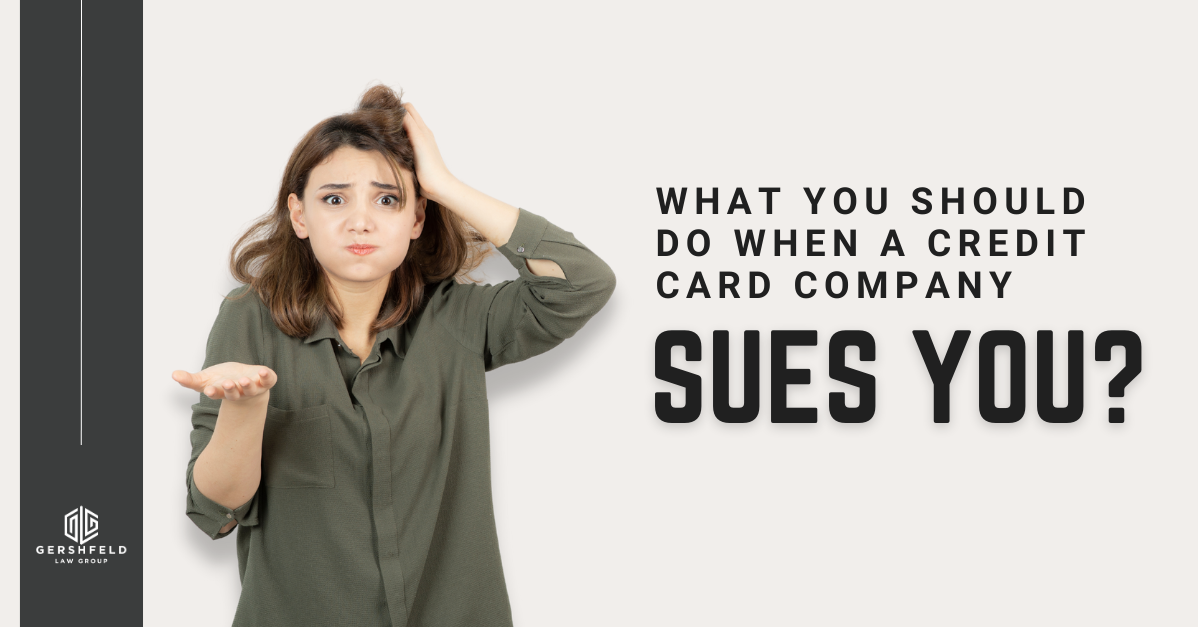Facing a lawsuit from a credit card company can be an intimidating and overwhelming experience. As the bills continue to pile up and the demands for payment become more insistent, it’s essential to understand the legal processes and potential consequences involved. At Gershfeld Law Group, we specialize in debt resolution and have guided numerous individuals through the challenging terrain of credit card company lawsuits.
In this blog, we will shed light on what you can expect when a credit card company takes legal action against you, providing insights into the steps involved, your rights, and how our experienced team can help you navigate this complex situation to achieve a resolution that suits your financial well-being.
Why Credit Card Companies Sue You
When you fall behind on your credit card payments, your credit card company will try to get you to pay in several ways. They might contact you through calls or letters, or they may involve a debt collector.
If they’ve informed you about the debt or made an effort to contact you, they’ll likely report your late payment to credit bureaus like Equifax, TransUnion, and Experian. If a debt collector is involved, you might also see a separate collection account on your credit report. Late payments, charge-offs, and collection accounts can all seriously damage your credit score.
It can be tempting to ignore calls and letters, but doing so can make things worse.
At this stage, a debt collection law firm might get involved, and they could give you one last chance to pay or settle your credit card debt. If you can’t work out an agreement that satisfies the creditor, the attorney may file a lawsuit against you. According to the Consumer Financial Protection Bureau, about 15% of consumers contacted about a debt in collections end up being sued in civil court.
If you miss multiple credit card payments in a row, the credit card company may decide to take legal action against you.
Is it Legal For Them To Sue?
Yes, credit card companies can technically sue you if you’ve missed payments for 180 days or more. Here’s what they might do:
Charge Off: If the debt is relatively small (usually under $8,000), they might “charge off” the debt without going to court to save on legal costs.
Debt Sale: They might sell your debt to a third-party collection agency, which could threaten to sue you, but not necessarily follow through.
Lawsuit: In some cases, they may file a lawsuit to push you into paying a one-time settlement or arrange a payment plan.
Around 15% of Americans with delinquent credit card debt end up facing lawsuits, as per the CFPB.
What Are Your Options
When a creditor or debt collector sues you for unpaid credit card debt, it’s essential to take the following steps:
- Verify the Debt:
When you find yourself facing a lawsuit over unpaid credit card debt, it’s crucial not to take the debt at face value just because it’s listed in a court complaint. Starting by asking the collector to verify the debt, ensuring that it indeed belongs to you. It’s not uncommon for creditors or debt collectors to make errors, or even in some cases, commit fraud in their debt collection efforts.
The Fair Debt Collection Practices Act (FDCPA) grants you the right to request debt verification. If you’re contemplating this step, consider consulting with an attorney who can handle the process on your behalf, providing you with valuable legal insight.
- Consult an Attorney:
When you’re sued by a credit card company or debt collector, it’s a wise move to seek legal representation. An attorney can play a crucial role in several ways, such as negotiating a settlement, responding to the lawsuit’s complaint, constructing a legal defense, or representing your interests in court. Facing a lawsuit is not uncommon for those who have ceased making monthly credit card payments while carrying high balances.
- Decide How to Respond:
Upon receiving the lawsuit-related documents, it’s vital to pay close attention to the details. You might have a limited timeframe, often 30 days or less, to respond to the summons. Failing to address the lawsuit and not appearing in court typically results in a default judgment against you. Instead of ignoring the lawsuit, it’s advisable to consider your options and select the one that aligns with your financial situation and comfort level. Three key options include debt settlement, legal representation, and bankruptcy.
- Debt settlement, a form of legal debt resolution, can be a viable choice, allowing you to negotiate with the debt collector before the trial date arrives. An attorney’s guidance is invaluable in this process to ensure you don’t accidentally forfeit any rights or agree to unfavorable terms.
- It’s essential not to procrastinate in consulting with a qualified attorney. You’ll likely need to draft a formal response to the lawsuit, and the court will impose deadlines that must be met.
- Lastly, bankruptcy is typically a last-resort option, but if you’re being sued for credit card debt that you can’t afford to pay, it may be worth considering. While bankruptcy can have an adverse impact on your credit score and borrowing capabilities in the short term, it may also protect you from wage garnishment, bank account levies, and other negative consequences that could arise from a debt collection lawsuit.
Gershfeld Law Group specializes in helping individuals facing credit card debt lawsuits, offering expert guidance on debt settlement (legal debt resolution) and bankruptcy. Reach out to them for assistance and explore the options tailored to your specific financial circumstances.







